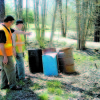DEP removes five oil drums from Casco tributary

POINTING OUT POTENTIAL POLLUTION — Casco Code Enforcement Officer Don Murphy joins forces with Stephen Brezinski, an oil and hazardous material specialist with the Department of Environmental Protection, in the removal of a contamination source on foreclosed property off State Park Road. (De Busk Photo)
By Dawn De Busk
Staff Writer
CASCO – The spring day brimmed with perfection.
The sunshine had wiped away a morning fog. The trees were lively with the bristling of birds. Lockets of purple flowers sprouted from a mossy carpet.
It was flawless — except for the five oil drums sitting above the brook, which is a tributary to Crooked River, which supplies water to Sebago Lake. Additionally, the metal and plastic drums were about 25 feet from the property’s drinking water well.
Around noon on Tuesday, the Department of Environmental Protection (DEP) coordinated the removal of seven oil drums from a foreclosed property on State Park Road.
According to Oil and Hazardous Materials Specialist Stephen Brezinski, the majority of the drums contained motor oil.
Brezinski explained he had been told that the former homeowner had dabbled in competitive car racing; and the motor oil in the vehicles was changed after every race.
Home heating oil had been kept in two of the drums, he said. One metal drum on the side of the house was empty, except for a few inches of water, he said.
Casco’s Code Enforcement Officer (CEO) Don Murphy had notified Brezinski last week of the environmental hazard.
After Brezinski walked the site with Murphy, he scheduled a contractor to remove the hazardous material.
On Tuesday, Environmental Projects, Incorporated (EPI) workers determined that none of the oil drums had leaks. Therefore, new caps were placed on the drums, and those containers were removed from the land.
According to an EPI employee, the drums will go to a hazardous waste facility in Rhode Island, Massachusetts, or New Jersey. Those are the locations of the companies with which EPI does business, he said.
If the containers did have leaks, then, an ‘overpack’ or larger drum would have been used to seal the drum.
Hazardous material jobs involving oil drums do not happen that frequently.
“We get calls — maybe twice a year — of drums near an abandoned house or a foreclosed house, or drums left on the side of the road,†Brezinski said.
“It happens. People don’t think about oil leaks,†he said.
Brezinski works for the Portland office of a branch of the DEP called the Branch of Remediation and Waste Materials.
The Portland office receives about 1,200 calls annually, he said. The majority of responses are for gas station spills, and vehicular accidents that involve 18-wheelers or hazardous material as the cargo.
“A tractor trailer can hold up to 200 gallons in the fuel tank,†he said.
The DEP responds to toxic spills that range from a few pints to 1,000s of gallons, he said.
On Tuesday morning, Brezinski had held off until the contractor arrived to tip the metal drums and make certain the bottom had not rusted out.
Everyone involved breathed a sigh of relief that none of the oil drums had leaked into a valuable water source. However, there is a cost involved.
According to Casco CEO Don Murphy, it becomes a bit more difficult for the state to be reimbursed when the property is in the hands of a bank or a mortgage company — as it now is.
The state funds a program that allows a homeowner to sign an agreement, and pay a small deductible ($500) for what could be a huge bill ($20,000) to remediate the soil and protect that groundwater, he said.
When Murphy first learned about the abandoned oil drums, he gained the ear of the Portland Water District. A PWD water resource specialist reviewed the site with the local CEO. In addition to a second set of eyes, Murphy wanted to know if PWD had funding or grants for this type of cleanup. Currently, the water district doesn’t have financial assistance for removing the waste products.
According to Murphy, in order to eliminate all the potential contaminants, some soil that was part of a garage fire will have to be removed. He said the home could be inhabitable once again. But, first it would need some maintenance, and a visit from a pest removal company.
“This was a step in the right direction,†he said, of removing the oil drums that had been on the site since last fall.

